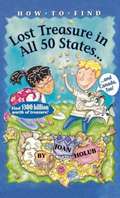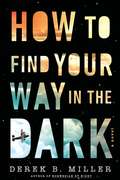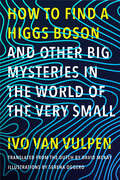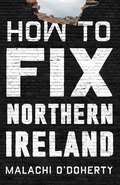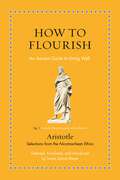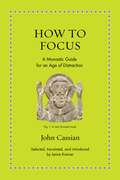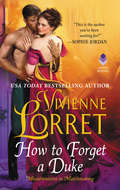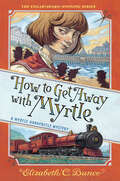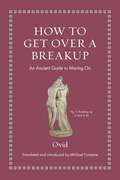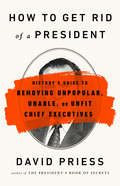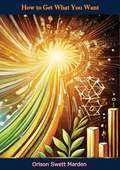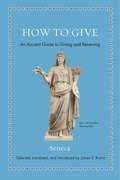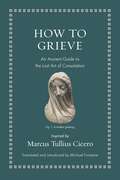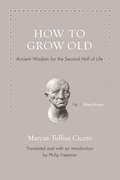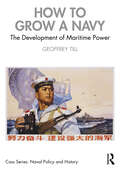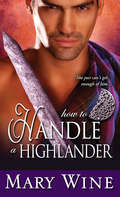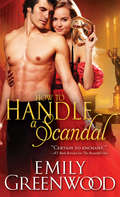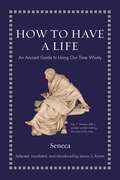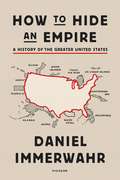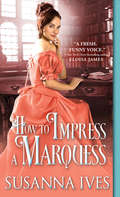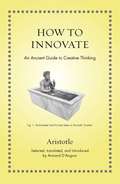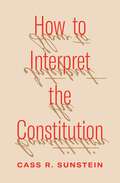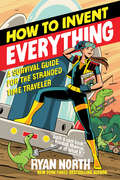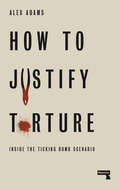- Table View
- List View
How to Fight, How to Kill: Child Soldiers in Liberia
by Human Rights WatchOver the last fourteen years, Liberians have known little but warfare. Conflict and civil war have devastated the country and taken an enormous toll on the lives of its citizens, especially children. Thousands of children have been victims of killings, rape and sexual assault, abduction, torture, forced labor and displacement at the hands of the warring factions. Children who fought with the warring parties are among the most affected by the war. Not only did they witness numerous human rights violations, they were additionally forced to commit abuses themselves.
How to Find Lost Treasure in All Fifty States and Canada Too!
by Joan HolubFrom the Book Jacket: Have you ever hidden something, and then forgotten where it was? Imagine if you buried a treasure, but couldn't find it when you went back to look. This has really happened! Here is information about real treasure lost in all fifty states, and even some in Canada! Read and be amazed. You know what? This book could make you the richest person in the world. AMAZING TRUE STORIES: * Coins and bits of treasure wash up on Florida beaches more often than anywhere else in the United States. * The Great Lakes are freshwater and are extremely cold. These water conditions help preserve sunken treasures better than warm saltwater oceans do. * In the United States alone there is $300 billion' worth of lost treasure waiting to be found! Ages 8 - 12
How to Find Your Way in the Dark (A Sheldon Horowitz Novel #1)
by Derek B. Miller"[Miller&’s] character portraits are indelible, often heartbreaking. At times this novel moved me to tears, the highest possible compliment.&”—New York Times Book Review With the wit and scope of Michael Chabon&’s The Amazing Adventures of Kavalier and Clay, Derek B. Miller tackles his most ambitious epic yet. At its heart is the return of Sheldon Horowitz, the protagonist from Miller&’s award-winning first novel, Norwegian by Night, who was lauded by Pulitzer Prize–winning author Richard Russo as &“one of the most memorable characters . . . that I&’ve encountered in years.&”MEET SHELDON IN THE MORNING OF HIS LIFE Twelve-year old Sheldon Horowitz is still recovering from the tragic loss of his mother only a year ago when a suspicious traffic accident steals the life of his father near their home in rural Massachusetts. It is 1938, and Sheldon, who was in the truck, emerges from the crash an orphan hell-bent on revenge. He takes that fire with him to Hartford, where he embarks on a new life under the roof of his buttoned-up Uncle Nate. Sheldon, his teenage cousins Abe and Mirabelle, and his best friend, Lenny, will contend with tradition and orthodoxy, appeasement and patriotism, mafia hitmen and angry accordion players, all while World War II takes center stage alongside a hurricane in New England and comedians in the Catskills. With his eye always on vengeance for his father&’s murder, Sheldon stakes out his place in a world he now understands is comprised largely of crimes: right and wrong, big and small.&“For me—as I&’m certain it will be for every reader of the wonderful Norwegian By Night—Derek B. Miller&’s new novel is a genuine literary event (Sheldon Horowitz is back!). Miller has long deserved to be a household name. How to Find Your Way in the Dark should finally make him one."—Richard Russo, author of Empire Falls and Chances Are...
How to Find a Higgs Boson—and Other Big Mysteries in the World of the Very Small
by Ivo van VulpenThe history of particle physics, the hunt for the most elusive particle, and the fundamental questions the search has inspired How did physicists combine talent and technology to discover the Higgs boson, the last piece in our inventory of the subatomic world? How did the Higgs change our understanding of the universe? And now, nearly a decade after its detection, what comes next? Answering these questions, Ivo van Vulpen—a CERN particle physicist and member of the team behind the detection—invites us on a journey to the frontiers of our knowledge. Enjoy van Vulpen&’s accessible explanation of the history of particle physics and of concepts like quantum mechanics and relativity—and ponder his inquiries regarding the search for new particles (to explain dark matter), a new force (to combine the existing fundamental forces), and new phenomena (undiscovered dimensions of space). This is a lively account of work at the world&’s highest-energy particle accelerator, with inspiring personal reflections on humanity&’s discoveries deeper and deeper into the world of the very small.
How to Fix Northern Ireland
by Malachi O'DohertyA highly topical and original investigation into the sectarian divide in Northern Ireland, published to coincide with the 25th anniversary of the Good Friday agreement.In this thought-provoking and engaging book, Malachi O'Doherty argues that division in Northern Ireland is fundamentally not about whether the country should be governed as part of Ireland or as part of Britain - as presumed by the Good Friday Agreement - but rather is entirely sectarian, an inter-ethnic stress comparable to racism.Part memoir, part history and part polemic, How to Fix Northern Ireland shows how the split between catholics and protestants infests everyday life - from education and segregated housing, from street protests, bonfires and parades to the high politics of power sharing and Brexit - and asks what can be done to solve a centuries-old social rift and heal the relationship at the heart of the problem.
How to Flourish: An Ancient Guide to Living Well (Ancient Wisdom For Modern Readers Ser.)
by AristotleAristotle’s essential guide to human flourishing—the Nicomachean Ethics—in a lively new abridged translationAristotle’s Nicomachean Ethics is one of the greatest guides to human flourishing ever written, but its length and style have left many readers languishing. How to Flourish is a carefully abridged version of the entire work in a highly readable and colloquial new translation by Susan Sauvé Meyer that makes Aristotle’s timeless insights about how to lead a good life more engaging and accessible than ever before.For Aristotle, flourishing involves becoming a good person through practice, and having a life of the mind. To that end, he draws vivid portraits of virtuous and vicious characters and offers sound practical advice about everything from eating and drinking to managing money, controlling anger, getting along with others, and telling jokes. He also distinguishes different kinds of wisdom that are essential to flourishing and offers an unusual perspective on how to appreciate our place in the universe and our relation to the divine.Omitting Aristotle’s digressions and repetitions and overly technical passages, How to Flourish provides connecting commentary that allows readers to follow the continuous line of his thought; it also features the original Greek on facing pages. The result is an inviting and lively version of an essential work about how to flourish and lead a good life.
How to Focus: A Monastic Guide for an Age of Distraction (Ancient Wisdom for Modern Readers)
by John CassianHow you can learn to focus like a monk without living like oneDistraction isn’t a new problem. We’re also not the first to complain about how hard it is to concentrate. Early Christian monks beat us to it. They had given up everything to focus on God, yet they still struggled to keep the demons of distraction at bay. But rather than surrender to the meandering of their minds, they developed powerful strategies to improve their attention and engagement. How to Focus is an inviting collection of their strikingly relatable insights and advice—frank, funny, sympathetic, and psychologically sophisticated.This wisdom is drawn from John Cassian’s fifth-century CE Collationes, one of the most influential manuals for monks from late antiquity. The Collationes follow Cassian and his friend Germanus as they travel around Egypt, asking a series of sage monks how they can make their minds stronger. In response, these monks offer a range of techniques for increasing focus, including setting goals, training the body, managing the memory, using mantras, taking breaks, consulting others—and, most of all, being honest about yourself. As Cassian and Germanus eventually realize, we can’t escape distraction—but we can learn how to confront it and, eventually, to concentrate.Featuring an engaging new translation by Jamie Kreiner and the original Latin on facing pages, How to Focus can help even the least monkish of us to train our attention on what matters most.
How to Forget a Duke (Misadventures in Matchmaking #1)
by Vivienne LorretThe Bourne Matrimonial Agency has one rule: Never fall in love with the client. A simple thing to remember . . . unless you’re a matchmaker with amnesia.The Duke of Rydstrom requires a wife. Preferably one with a large fortune and a complete lack of curiosity. The last thing he needs is a meddling matchmaker determined to dig up his dark family secrets.All Jacinda wants is to find a bride for a duke. How hard could that be? He’s handsome, enigmatic . . . and hiding something. She’s sure of it. Determined to discover what it is, she travels to his crumbling cliffside estate. Yet, by the time she washes up on his beach, she can no longer remember who she is or why the duke is so familiar to her. All she knows is that his kisses are unforgettable—and she intends to use every skill she can to discover what’s in his heart . . .When Miss Bourne can’t remember what brought her to his ancestral home, Rydstrom intends to keep it that way. Yet as the days pass, his true challenge will be safeguarding his secret while resisting this woman who—confound it all—may well be his perfect match.
How to Get Away with Myrtle (Myrtle Hardcastle Mystery)
by Elizabeth C. BunceBefore the train has left the station, England’s most accomplished new detective already is on a suspect’s trail, and readers will be delighted to travel along. Myrtle Hardcastle has no desire to go on a relaxing travel excursion with her aunt Helena when there are More Important things to be done at home, like keeping close tabs on criminals and murder trials. Unfortunately, she has no say in the matter. So off Myrtle goes—with her governess, Miss Judson, and cat, Peony, in tow—on a fabulous private railway coach headed for the English seaside. Myrtle is thrilled to make the acquaintance of Mrs. Bloom, a professional insurance investigator aboard to protect the priceless Northern Lights tiara. But before the train reaches its destination, both the tiara and Mrs. Bloom vanish. When Myrtle arrives, she and Peony discover a dead body in the baggage car. Someone has been murdered—with Aunt Helena’s sewing shears. The trip is derailed, the local police are inept, and Scotland Yard is in no rush to arrive. What’s a smart, bored Young Lady of Quality stranded in a washed-up carnival town to do but follow the evidence to find out which of her fellow travelers is a thief and a murderer?
How to Get Over a Breakup: An Ancient Guide to Moving On (Ancient Wisdom for Modern Readers)
by OvidA modern translation of the ancient Roman poet Ovid&’s Remedies for Love—a witty and irreverent work about how to fall out of loveBreakups are the worst. On one scale devised by psychiatrists, only a spouse&’s death was ranked as more stressful than a marital split. Is there any treatment for a breakup? The ancient Roman poet Ovid thought so. Having become famous for teaching the art of seduction in The Art of Love, he then wrote Remedies for Love (Remedia Amoris), which presents thirty-eight frank and witty strategies for coping with unrequited love, falling out of love, ending a relationship, and healing a broken heart. How to Get Over a Breakup presents an unabashedly modern prose translation of Ovid&’s lighthearted and provocative work, complete with a lively introduction and the original Latin on facing pages.Ovid&’s advice—which he illustrates with ingenious interpretations of classical mythology—ranges from the practical, psychologically astute, and profound to the ironic, deliberately offensive, and bizarre. Some advice is conventional—such as staying busy, not spending time alone, and avoiding places associated with an ex. Some is off-color, such as having sex until you&’re sick of it. And some is simply and delightfully weird—such as becoming a lawyer and not eating arugula.Whether his advice is good or bad, entertaining or outrageous, How to Get Over a Breakup reveals an Ovid who sounds startlingly modern.
How to Get Rid of a President: History's Guide to Removing Unpopular, Unable, or Unfit Chief Executives
by David PriessA vivid political history of the schemes, plots, maneuvers, and conspiracies that have attempted--successfully and not--to remove unwanted presidentsTo limit executive power, the founding fathers created fixed presidential terms of four years, giving voters regular opportunities to remove their leaders. Even so, Americans have often resorted to more dramatic paths to disempower the chief executive. The American presidency has seen it all, from rejecting a sitting president's renomination bid and undermining their authority in office to the more drastic methods of impeachment, and, most brutal of all, assassination.How to Get Rid of a President showcases the political dark arts in action: a stew of election dramas, national tragedies, and presidential departures mixed with party intrigue, personal betrayal, and backroom shenanigans. This briskly paced, darkly humorous voyage proves that while the pomp and circumstance of presidential elections might draw more attention, the way that presidents are removed teaches us much more about our political order.
How to Get What You Want
by Orison Swett MardenOrison Swett Marden’s "How to Get What You Want" is a timeless guide to personal achievement and success, offering practical wisdom and motivational insights to help readers realize their deepest desires and goals. Marden, a pioneer of the self-help movement and the founder of Success magazine, draws on his extensive experience and understanding of human potential to provide a roadmap for transforming dreams into reality.In this empowering work, Marden explores the key principles and attitudes that are essential for achieving success in any area of life. His clear and engaging writing style makes complex concepts accessible and actionable, inspiring readers to take control of their destinies and unlock their full potential.Key themes include:Positive Thinking: Marden emphasizes the power of a positive mindset in shaping one’s reality. He provides practical strategies for cultivating optimism and resilience, demonstrating how a positive outlook can attract opportunities and drive success.Goal Setting: The book highlights the importance of setting clear, specific, and achievable goals. Marden offers guidance on how to define your objectives, create a plan of action, and stay focused and motivated throughout your journey.Self-Discipline and Persistence: Marden underscores the value of self-discipline and perseverance in overcoming obstacles and achieving long-term success. He shares inspiring stories of individuals who have achieved greatness through unwavering determination and hard work.Harnessing Inner Strength: The book explores the concept of inner strength and its role in personal development. Marden provides techniques for building self-confidence, overcoming fear, and tapping into the innate power within each person.Balanced Success: Recognizing that true success encompasses more than just material wealth, Marden advocates for a balanced approach to life. He discusses the significance of health, relationships, and personal fulfillment as integral components of a successful life.
How to Give: An Ancient Guide to Giving and Receiving (Ancient Wisdom for Modern Readers)
by SenecaTimeless wisdom on generosity and gratitude from the great Stoic philosopher SenecaTo give and receive well may be the most human thing you can do—but it is also the closest you can come to divinity. So argues the great Roman Stoic thinker Seneca (c. 4 BCE–65 CE) in his longest and most searching moral treatise, “On Benefits” (De Beneficiis). James Romm’s splendid new translation of essential selections from this work conveys the heart of Seneca’s argument that generosity and gratitude are among the most important of all virtues.For Seneca, the impulse to give to others lies at the very foundation of society; without it, we are helpless creatures, worse than wild beasts. But generosity did not arise randomly or by chance. Seneca sees it as part of our desire to emulate the gods, whose creation of the earth and heavens stands as the greatest gift of all. Seneca’s soaring prose captures his wonder at that gift, and expresses a profound sense of gratitude that will inspire today’s readers.Complete with an enlightening introduction and the original Latin on facing pages, How to Give is a timeless guide to the profound significance of true generosity.
How to Grieve: An Ancient Guide to the Lost Art of Consolation (Ancient Wisdom for Modern Readers)
by Marcus Tullius CiceroAn engaging new translation of a timeless masterpiece about coping with the death of a loved oneIn 45 BCE, the Roman statesman Cicero fell to pieces when his beloved daughter, Tullia, died from complications of childbirth. But from the depths of despair, Cicero fought his way back. In an effort to cope with his loss, he wrote a consolation speech—not for others, as had always been done, but for himself. And it worked. Cicero’s Consolation was something new in literature, equal parts philosophy and motivational speech. Drawing on the full range of Greek philosophy and Roman history, Cicero convinced himself that death and loss are part of life, and that if others have survived them, we can, too; resilience, endurance, and fortitude are the way forward.Lost in antiquity, Cicero’s Consolation was recreated in the Renaissance from hints in Cicero’s other writings and the Greek and Latin consolatory tradition. The resulting masterpiece—translated here for the first time in 250 years—is infused throughout with Cicero’s thought and spirit.Complete with the original Latin on facing pages and an inviting introduction, Michael Fontaine’s engaging translation makes this searching exploration of grief available to readers once again.
How to Grow Old: Ancient Wisdom for the Second Half of Life (Ancient Wisdom for Modern Readers)
by Marcus Tullius CiceroTimeless wisdom on growing old gracefully from one of ancient Rome's greatest philosophersWorried that old age will inevitably mean losing your libido, your health, and possibly your marbles too? Well, Cicero has some good news for you. In How to Grow Old, the great Roman orator and statesman eloquently describes how you can make the second half of life the best part of all—and why you might discover that reading and gardening are actually far more pleasurable than sex ever was.Filled with timeless wisdom and practical guidance, Cicero's brief, charming classic—written in 44 BC and originally titled On Old Age—has delighted and inspired readers, from Saint Augustine to Thomas Jefferson, for more than two thousand years. Presented here in a lively new translation with an informative new introduction and the original Latin on facing pages, the book directly addresses the greatest fears of growing older and persuasively argues why these worries are greatly exaggerated—or altogether mistaken.Montaigne said Cicero's book "gives one an appetite for growing old." The American founding father John Adams read it repeatedly in his later years. And today its lessons are more relevant than ever in a world obsessed with the futile pursuit of youth.
How to Grow a Navy: The Development of Maritime Power (Cass Series: Naval Policy and History)
by Geoffrey TillThis book examines the large but neglected topic of the development of maritime power from both an historical and a contemporary point of view. Navies have never been more important than they are now, in a century becoming, as widely expected, increasingly and profoundly maritime. The growing competition between China and Russia with the United States and its allies and partners around the world is essentially sea-based. The sea is also central to the world's globalised trading system and to its environmental health. Most current crises are either sea-based or have a critical maritime element to them. What happens at sea will help shape our future. Against that background, this book uses both history and contemporary events to analyse how maritime power and naval strength has been, and is being, developed. In a reader-friendly way, it seeks to show what has worked and what has not, and to uncover the recurring patterns in maritime and naval development which explain past, present and future success - and failure. It reflects on the historical experience of all navies, but in particular it poses the question of whether China is following the same pattern of naval development illustrated by Britain at the start of the 18th century, which led to two centuries of naval dominance. This book will be of much interest to students of maritime power, naval studies, and strategic studies, as well as to naval professionals around the world.
How to Handle a Highlander
by Mary WineIn a Land of Warriors Playing a Deadly Game... Moira Fraser has been given an ultimatum--marry the elderly Laird Achaius Morris, or risk another deadly clan war. She vows to do the right thing, as long as she can steer clear of the devilish charms of one stubborn Highlander... How Do You Avoid Becoming a Pawn? Gahn Sutherland knows there's a dangerous plot behind Moira Fraser's wedding, and will stop at nothing to foil it. But where a hot-headed, fiery Highland lass is involved, trust and honor clash with forbidden attraction, threatening to blow the Highland's sky-high.
How to Handle a Scandal
by Emily GreenwoodThey thought the debutante was scandalous. Miss Elizabeth Tarryton was the toast of the London Season the year she was seventeen and spurned young Tommy Halifax. A careless flirt who didn't know what she wanted, she was startled into laughter by his public proposal of marriage. Furious and heartbroken, Tommy promptly left home for a life of adventure in India.If they only knew about the widowSeven years later, Elizabeth has much to make up for, but the methods she chooses for doing good are as shocking as her earlier wanton behavior--should the ton ever find out. Tommy returns to England a hero, with no intention of allowing himself to be hurt by a woman ever again, but he's fascinated nonetheless by Elizabeth, now widowed and more alluring than ever.
How to Have a Life: An Ancient Guide to Using Our Time Wisely (Ancient Wisdom for Modern Readers)
by SenecaA vibrant new translation of Seneca’s “On the Shortness of Life,” a pointed reminder to make the most of our timeWho doesn’t worry sometimes that smart phones, the Internet, and TV are robbing us of time and preventing us from having a life? How can we make the most of our time on earth? In the first century AD, the Stoic philosopher Seneca the Younger offered one of the most famous answers to that question in his essay “On the Shortness of Life”—a work that has more to teach us today than ever before. In How to Have a Life, James Romm presents a vibrant new translation of Seneca’s brilliant essay, plus two Senecan letters on the same theme, complete with the original Latin on facing pages and an inviting introduction.With devastating satiric wit, skillfully captured in this translation, Seneca lampoons the ways we squander our time and fail to realize how precious it is. We don’t allow people to steal our money, yet we allow them to plunder our time, or else we give it away ourselves in useless, idle pursuits. Seneca also describes how we can make better use of our brief days and years. In the process, he argues, we can make our lives longer, or even everlasting, because to live a real life is to attain a kind of immortality.A counterweight to the time-sucking distractions of the modern world, How to Have a Life offers priceless wisdom about making our time—and our lives—count.
How to Hide an Empire: A History of the Greater United States
by Daniel ImmerwahrA pathbreaking history of the United States’ overseas possessions and the true meaning of its empireWe are familiar with maps that outline all fifty states. And we are also familiar with the idea that the United States is an “empire,” exercising power around the world. But what about the actual territories—the islands, atolls, and archipelagos—this country has governed and inhabited?In How to Hide an Empire, Daniel Immerwahr tells the fascinating story of the United States outside the United States. In crackling, fast-paced prose, he reveals forgotten episodes that cast American history in a new light. We travel to the Guano Islands, where prospectors collected one of the nineteenth century’s most valuable commodities, and the Philippines, site of the most destructive event on U.S. soil. In Puerto Rico, Immerwahr shows how U.S. doctors conducted grisly experiments they would never have conducted on the mainland and charts the emergence of independence fighters who would shoot up the U.S. Congress.In the years after World War II, Immerwahr notes, the United States moved away from colonialism. Instead, it put innovations in electronics, transportation, and culture to use, devising a new sort of influence that did not require the control of colonies. Rich with absorbing vignettes, full of surprises, and driven by an original conception of what empire and globalization mean today, How to Hide an Empire is a major and compulsively readable work of history.
How to Impress a Marquess
by Susanna Ives"A fresh voice that reminded me of Julia Quinn's characters." --Eloisa James, New York Times bestselling authorTAKE ONE MARQUESS: Proper, put-upon, dependable, but concealing a sensitive artist's soul.ADD ONE BOHEMIAN LADY: Creative, boisterous, unruly, but secretly yearning for a steadfast love, home, and family.STIR in a sensational serialized story that has society ravenous for each installment.COMBINE with ambitious guests at an ill-fated house party hosted by a treacherous dowager possessing a poison tongue.SHAKE until a stuffy marquess and rebellious lady make a shocking discovery: the contents of their hearts are just alike.Take a sip. You'll laugh, you'll swoon, you'll never want this moving Victorian love story to end."With [an] intriguing plot, quirky characters, witty escapades, and heartfelt dialogue, Ives has created a read that's as thought-provoking as it is romantic." --RT Book Reviews, 4 ½ stars and nominee for Best First Historical Romance, Wicked Little Secrets "Will touch readers' hearts. Ives delivers on every level" --RT Book Reviews for Wicked, My Love Top Pick 4 stars "I have never, ever laughed so hard or swooned so much while reading a historical romance." --Long and Short Reviews for Wicked Little Secrets
How to Innovate: An Ancient Guide to Creative Thinking (Ancient Wisdom for Modern Readers)
by AristotleWhat we can learn about fostering innovation and creative thinking from some of the most inventive people of all times—the ancient GreeksWhen it comes to innovation and creative thinking, we are still catching up with the ancient Greeks. Between 800 and 300 BCE, they changed the world with astonishing inventions—democracy, the alphabet, philosophy, logic, rhetoric, mathematical proof, rational medicine, coins, architectural canons, drama, lifelike sculpture, and competitive athletics. None of this happened by accident. Recognizing the power of the new and trying to understand and promote the conditions that make it possible, the Greeks were the first to write about innovation and even the first to record a word for forging something new. In short, the Greeks “invented” innovation itself—and they still have a great deal to teach us about it.How to Innovate is an engaging and entertaining introduction to key ideas about—and examples of—innovation and creative thinking from ancient Greece. Armand D’Angour provides lively new translations of selections from Aristotle, Diodorus, and Athenaeus, with the original Greek text on facing pages. These writings illuminate and illustrate timeless principles of creating something new—borrowing or adapting existing ideas or things, cross-fertilizing disparate elements, or criticizing and disrupting current conditions.From the true story of Archimedes’s famous “Eureka!” moment, to Aristotle’s thoughts on physical change and political innovation, to accounts of how disruption and competition drove invention in Greek warfare and the visual arts, How to Innovate is filled with valuable insights about how change happens—and how to bring it about.
How to Interpret the Constitution
by Cass R. SunsteinFrom New York Times bestselling author Cass Sunstein, a timely and powerful argument for rethinking how the U.S. Constitution is interpretedThe U.S. Supreme Court has eliminated the right to abortion and is revisiting other fundamental questions today—about voting rights, affirmative action, gun laws, and much more. Once-arcane theories of constitutional interpretation are profoundly affecting the lives of all Americans. In this brief and urgent book, Harvard Law School professor Cass Sunstein provides a lively introduction to competing approaches to interpreting the Constitution—and argues that the only way to choose one is to ask whether it would change American life for the better or worse. If a method of interpretation would eliminate the right of privacy, allow racial segregation, or obliterate free speech, it would be unacceptable for that reason.But some Supreme Court justices are committed to “originalism,” arguing that the meaning of the Constitution is settled by how it was publicly understood when it was ratified. Originalists insist that their approach is dictated by the Constitution. That, Sunstein argues, is a big mistake. The Constitution doesn’t contain instructions for its own interpretation. Any approach to constitutional interpretation needs to be defended in terms of its broad effects—what it does to our rights and our institutions. It must respect those rights and institutions—and safeguard the conditions for democracy itself.Passionate and compelling, How to Interpret the Constitution is essential reading for anyone who is concerned about how the Supreme Court is changing the rights and lives of Americans today.
How to Invent Everything: A Survival Guide for the Stranded Time Traveler
by Ryan North"How to Invent Everything is such a cool book. It's essential reading for anyone who needs to duplicate an industrial civilization quickly." --Randall Munroe, xkcd creator and New York Times-bestselling author of What If? The only book you need if you're going back in timeWhat would you do if a time machine hurled you thousands of years into the past. . . and then broke? How would you survive? Could you improve on humanity's original timeline? And how hard would it be to domesticate a giant wombat? With this book as your guide, you'll survive--and thrive--in any period in Earth's history. Bestselling author and time-travel enthusiast Ryan North shows you how to invent all the modern conveniences we take for granted--from first principles. This illustrated manual contains all the science, engineering, art, philosophy, facts, and figures required for even the most clueless time traveler to build a civilization from the ground up. Deeply researched, irreverent, and significantly more fun than being eaten by a saber-toothed tiger, How to Invent Everything will make you smarter, more competent, and completely prepared to become the most important and influential person ever. You're about to make history. . . better.
How to Justify Torture: Inside the Ticking Bomb Scenario
by Alex AdamsFrom Batman Begins to Tom Clancy, How to Justify Torture shows how contemporary culture creates simplified narratives about good guy torturers and bad guy victims, how dangerous this is politically, and what we can do to challenge it.If there was a bomb hidden somewhere in a major city, and you had the person responsible in your custody, would you torture them to get the information needed to stop the bomb exploding, preventing a devastating terrorist attack and saving thousands of lives?This is the ticking bomb scenario -- a thought experiment designed to demonstrate that torture can be justified.In How to Justify Torture, cultural critic Alex Adams examines the ticking bomb scenario in-depth, looking at the ways it is presented in films, novels, and TV shows -- from Batman Begins and Dirty Harry to French military thrillers and home invasion narratives. By critiquing its argument step by step, this short, provocative book reminds us that, despite what the ticking bomb scenario will have us believe, torture can never be justified.

